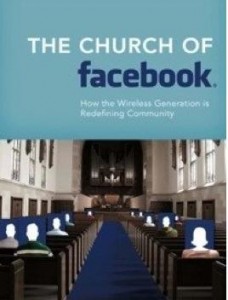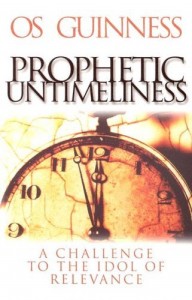The Church of Facebook
 Ever thought about how quickly and pervasively social networks have infiltrated our lives — whether we ourselves are online or not? The Church of Facebook: How the Hyperconnected Are Redefining Community supplies an interesting and readable reflection on the subject, and though it doesn’t totally succeed in delivering on the promise of its title it leaves its reader with lots to think about.
Ever thought about how quickly and pervasively social networks have infiltrated our lives — whether we ourselves are online or not? The Church of Facebook: How the Hyperconnected Are Redefining Community supplies an interesting and readable reflection on the subject, and though it doesn’t totally succeed in delivering on the promise of its title it leaves its reader with lots to think about.
To me, the title suggests that it’s either going to examine how Facebook could function like church, or how Facebook is an inadequate substitute for Christian community. It really does neither. Instead, it explores the way Facebook (and online “relationship”) addresses the need for home and belonging, and gives a few tips for establishing healthy boundaries.
In the process, author Jesse Rice lays out a range of evidence, from rhesus monkeys to the Hubble space telescope, from Jesus and the woman at the well to a Kentucky man whose sight was restored in middle age, from the origin and development of Facebook to the debates among various Christian spokespersons about its impact on community, from the Millenium Bridge in England to a number of books and studies on the subject of cyber-life. The strength of the book, to me, is this diversity of evidence, and Jesse Rice is a likable guide throughout. His voice is reasonable and non-threatening, not strident or condescending.
This was both a strength and a weakness. I wished at times that his thesis was more clear or strong throughout. But this book is more of an exploration than an argument, and it leaves it to the reader to respond. I think it would be very helpful to someone who wants to take a step back from their online involvement and get a fuller perspective on it. I purposely resisted marking up my book so that I can lend it out without my usual scrawls and underlinings cluttering up the next reader’s experience.
But I have to add that I was unconvinced by Rice’s closing assertion that we can “take our co-creative tools modeled by Jesus — intentionality, humility, and authenticity — and use them to make something good like Facebook even better.” There is really precious little in the preceding pages to support the view that Facebook is “good,” for one thing. For another thing, the comparison Rice attempts to make between using these “tools” on Facebook, and Jesus’s life-changing interaction with the woman at the well in John 4, falls flat. I don’t think there’s any way to re-create what Jesus does in that conversation on Facebook.
As a disclaimer, I should acknowledge the obvious: this is not a subject I’m open-minded about. I already have a point of view on Facebook, and I’ve written about it at different times on this blog. This book is really for people on the inside who are beginning to realize it has a greater impact than they bargained for.


